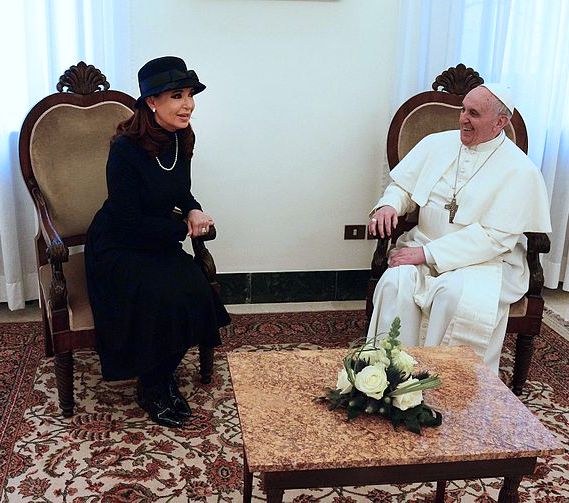Saint Therese of the Child Jesus
of the Holy Face
Entries in Patron of Missions (2)
On the feast of St. Therese of Lisieux, Pope Francis praises her example, “which makes the people say: we want to come with you!” Video from Romereports, October 1, 2013
This morning, concelebrating Mass in his residence, the Domus Sanctae Marthae, with the eight cardinals he selected in April to counsel him about reforming the governance of the Roman Curia, Pope Francis held up St. Therese of Lisieux as a model to the Cardinals, praying that “our work today will make us all more humble, more gentle, more patient, more trusting in God.”
Pope Francis reflected on today’s gospel: the apostles asked Jesus whether they might call down fire from heaven on those who did not welcome them. The Pope said that the Christian way is not a way of vengeance, but instead the way of humility and gentleness.
The Pope noted that today is the feast of St. Therese of the Child Jesus, whose life calls everyone to “think about this spirit of humility, of tenderness, of goodness. It is a spirit that the Lord wants from all of us. Where, then, is the power that brings us to this spirit? It is found in love, in charity, in the awareness that we are in the hands of the Father. With this awareness one will not want “to call down fire from Heaven.”
“Another spirit comes, that of that charity that suffers all, pardons all, that does not boast, that is humble, that doesn’t seek itself. Someone could say — and there are some philosophers that think this way — that this is a humiliation of the majesty of man, of the greatness of man. This is sterile! The Church has wisely made this saint, humble, small, trusting in God, gentle: she has made her the Patron of Missions."
The strength of the Gospel is there “because the Gospel reaches its highest point in the humiliation of Jesus: humility that becomes humiliation. And the force of the Gospel, he said, is properly in humility, in the humility of the child that is guided by the love and the tenderness of the father.
The Church, Benedict XVI told us, does not grow through proselytism, it grows through attraction, through witness. And when the people see this witness of humility, of gentleness, of mildness, they feel the need that the Prophet Zachariah spoke of: ‘We want to come with you.’ The people feel that need in the face of the witness of charity, of this humble charity, without bullying, not sufficient, humble. Worship and serve! Charity is simple: worship God and serve others! And this witness makes the Church grow.” That’s why a nun, so humble, but so trusting in God, a nun like St. Therese of the Child Jesus was named Patron of the Missions, because of her example which makes “the people say ‘we want to come with you!’”
Today, here in the Vatican, begins the meeting with the Cardinal consulters, who are concelebrating the Mass. Let us ask the Lord that our work today will make us all more humble, more gentle, more patient, more trusting in God, so that the Church can give a beautiful witness to the people, and seeing the People of God, seeing the Church, they might feel the desire to come with us.”
[The above is based on a summary of the Pope’s remarks from Romereports]
* * * * *
Pope Francis’s homily echoes Therese in several different ways. His line “because the Gospel reaches its highest point in the humiliation of Jesus: humility that becomes humiliation” recalls the “Prayer to obtain humility” Therese wrote for Sister Martha of Jesus, a lay-sister who had some difficulty letting the other nuns order her about:
Now in the Sacred Host I see you at the height of your annihilations. How humble you are, O divine King of Glory, to subject yourself to all your priests without making any distinction between those who love you and those who are, alas! lukewarm or cold in your service... At their word you come down from heaven. Whether they advance or delay the hour of the Holy Sacrifice, you are always ready O my Beloved, how gentle and humble of heart You seem under the veil of the white Host! To teach me humility you cannot humble yourself further.
Read the full text of St. Therese's "Prayer to obtain humility" at to see how Therese understood the humility Pope Francis praises.
The importance Therese attached to being humble is also at the center of her “pious recreation” (a short play she wrote to be acted at a feast-day recreation) “The Triumph of Humility,” which ends
Fervent Carmelites, you desire
To gather heartsw for Jesus, your Spouse.
Then stay forever little for Him.
Humility puts hell in a rage.
Pope Francis speaks about attraction:
The Church, Benedict XVI told us, does not grow through proselytism, it grows through attraction, through witness. And when the people see this witness of humility, of gentleness, of mildness, they feel the need that the Prophet Zachariah spoke of: ‘We want to come with you.’
Therese writes about her spiritual attraction:
When a soul allows herself to be captivated [5] by the odor of your ointments, she cannot run alone, all the souls whom she loves follow in her train; this is done without constraint, without effort, it is a natural consequence of her attraction for You. Just as a torrent, throwing itself with impetuosity into the ocean, drags after it everything it encounters in its passage, in the same way, [10] O Jesus, the soul who plunges into the shoreless ocean of Your Love, draws with her all the treasures she possesses.
Sister Martha of Jesus testifies about her attraction to Therese:
Indeed, had I followed my natural inclination, I would often have avoided going to her for guidance, because I knew she would tell me my faults. But her holiness attracted me so strongly that I went to her almost in spite of myself.
What would the Church look like if it were renewed in the image of St. Therese, as Pope Francis prayed this morning?
"A White Rose from Saint Therese" by Stefania Falasca. Pope Francis's devotion to St. Therese. March 24, 2013
A White Rose from Saint Therese
Mary and Joseph, but also the Carmelite of Lisieux: the Pope is very tied to the master/teacher of child-like spirituality: “Whenever I have a problem—he explained—I put confide it to her. I don’t ask that she solve it for me, only that she take it into her hands and help me.”
The devotion and spiritual bond of Bergoglio for the “Little Flower of Jesus.” “This is what I call her when I ask for her help.”
By Stefania Falasca
Whoever has had the opportunity to get to know and be friends with Cardinal Jorge Maria Bergoglio knows that it was his custom to include, even in a short note, an ancient image of Mary venerated in Bavaria, at Augsburg, in the Church of St. Peter, called “She who unties knots.” To this he always added a little holy card of Saint Joseph and another of the Carmelite saint and Doctor of the Church, Therese of Lisieux—almost to emphasize, by his deeply meaningful personal choice, the spiritual bond that unites him to them.
 Christina Kirchner, president of Argentina, with Pope Francis and St. Therese's white roses
Christina Kirchner, president of Argentina, with Pope Francis and St. Therese's white roses
In recent days we have seen Pope Francis refer, by his gestures and teaching, to Mary and Saint Joseph, in profound and discreet ways. Neither has the gift to Argentine President Christine Kirchner of the Aparecida Statement (the concluding text of the fifth conference of all the Bishops of Latin America), along with a white rose, gone without notice. A sensitive gesture—the gift of a rose—that the President herself did not fail to call “intimate,” like “a greeting from Saint Therese, to whom Pope Francis directs his prayers.”
But why and from where does this preference of Pope Francis for Therese come? I asked myself this even at Aparecida in 2007. I had briefly met Cardinal Bergoglio in the portico of the Brazilian Marian shrine between one meeting or another of the preparatory commission for the final statement.
He had told me that wherever the bishops gathered to work together, they were so aware of the prayers and singing of the faithful and that this gave them a lively sense of belonging and closeness to the people, to a Church that walks with its people . . . I have to admit that what came across to me in that moment in his “spiritual” tone was patronizing and vague, rather than a strong and challenging statement to be noticed.
But the Cardinal had continued: “We shouldn’t be afraid to rely solely on the tenderness of God, as Therese of Lisieux did, who is precisely for this a favored daughter of Our Lady and a great missionary saint.”
It was an understanding of the Church and her mission along the lines of the “little way” opened by the teacher of spiritual child-like spirituality, which we see today woven all through the first acts of the pontificate of Pope Francis.
I later learned that when he came to Rome to deal with this or that ministerial obligation, the cardinal always went to pray at a statue of Therese of the Child Jesus in a little Franciscan church in the Borgo near the Tiber. And also how much his devotion to the Patron of the Missions was known by his priests in Buenos Aires, especially in the poor areas of the Argentine capital.  Cardinal Bergoglio
Cardinal Bergoglio
But let’s now get back to the roses. Cardinal Bergoglio had returned to Rome at the end of 2007 for the Consistory. And with him he brought back St. Theresa: “When I have a problem—he told us—I confide it to her. I don’t ask that she solve it for me, only that she take it in her hands and help me; as a sign, I almost always receive a rose.” He then related how one time, when he had to make an important decision about a complex matter, he left it in her hands. Sometime later, an unknown woman placed three white roses at the doorstep of the sacristy.
“It was a Jesuit—he explained—Fr. Putigan, who in 1925 began to spread this personal prayer of intercession,” and he repeated a section of the “Prayer to ask for a rose”: “Little Flower of Jesus, ask God today that he will grant the petition that I now place with confidence into your hands.”
One perceives in his way of speaking a shyness combined with simplicity, a sincere confidence, so much so that I was moved to imitate him. In a particular situation, taking him as an example, I prayed like him to St. Therese, but to my great regret I received no rose. At my first opportunity I briefly told him about it over the telephone. I told him, “Father, remember that prayer about roses . . . look, nothing…no roses for me. But listen, I’m not surprised; I can understand it; these things work with holy people like you, who have their lives in order, and I am certainly not what one might call a virtuous flower.”
First silence on the other end, then his calm voice replied, blowing me away another time: “This means that she will answer you with a greater grace than the one you asked for.” It really turned out that way.

translated from "Una rosa bianca da Santa Teresa" by Stefania Falasca in the March 24, 2013 issue of l'Avvenire. English translation copyright Maureen O'Riordan 2013.